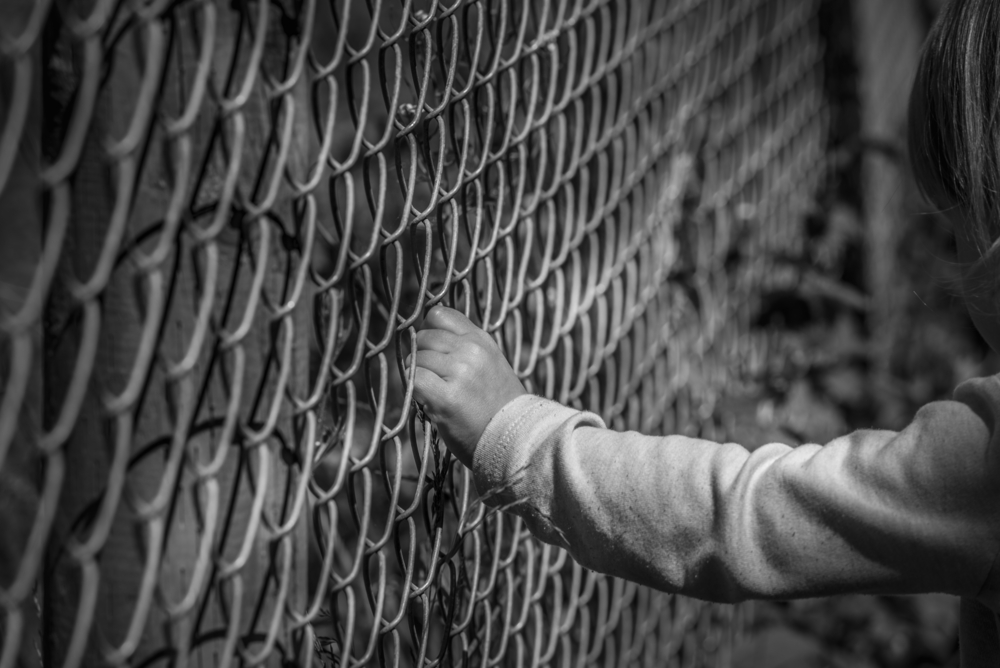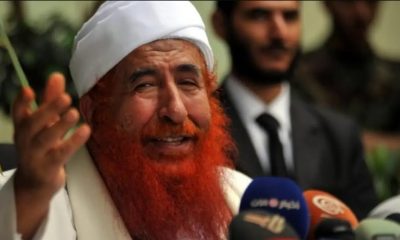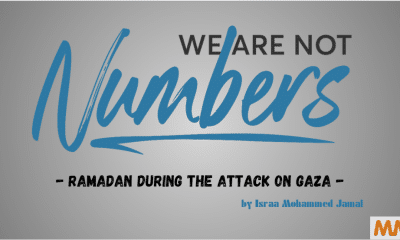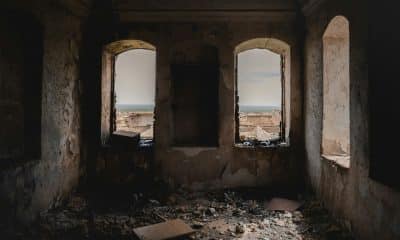#Society
BlackMuslimBan | Take Down the Wall in Your Hearts

Published

It’s encouraging to see what happens when, despite our differences, we come together for the greater good. Seeing droves of people around the nation and world stand up with us against the unjust #MuslimBan gives me hope for a better world. However, I can’t help wondering what we as a Muslim community in America are offering our refugee and immigrant brothers and sisters once the ban is lifted and they are given the right to live here. Will we invite them to our (non-existent) loving, united Muslim community, which is based on the Islamic teachings of tolerance and inclusion that the #MuslimBan seeks to obliterate? Or will we do what we’ve always done: invite them to support the bans we hold closest to our hearts, the most sacred of which seems to be the #BlackMuslimBan.
It is no secret that one of the pieces of advice many immigrants receive upon settling in America is to dissociate from African-Americans, at all costs. Thankfully, there are exceptions to this, as there are intercultural communities and organizations in which grassroots work is being done to combat racial and ethnic division in the Muslim community in America. However, the problem of anti-Black racism remains quite widespread and is manifested in the common advice passed around in communities comprised of mostly immigrants and their American-born children and grandchildren. Sometimes the advice is overt, other times subtle. But the message is passed on (and understood quite clearly) nonetheless: African-Americans are violent, immoral, and intellectually inferior, they are told, and they blame racism for all their problems; meanwhile the real problem is themselves—whether due to lack of personal motivation and laziness, or to the pathological “breakdown” of their families.
This racist message is so widespread and accepted among non-Black-Americans that aspects of it were echoed at the 2016 RIS (Reviving the Islamic Spirit) Conference from one of the most celebrated American Muslim scholars in the world, Hamza Yusuf. Ironically, his racially insensitive remarks were made in a context in which he was being asked about the collective Muslim responsibility in joining efforts to combat anti-Black racism. When there was an uproar (and justifiably so) against his sharing grossly misleading information about African-Americans being killed by police, he said this during the clarification of his point: “[My point is that] the biggest crisis facing the African-American communities in the United States is not racism; it is the breakdown of the Black family.”
Keep supporting MuslimMatters for the sake of Allah
Alhamdulillah, we're at over 850 supporters. Help us get to 900 supporters this month. All it takes is a small gift from a reader like you to keep us going, for just $2 / month.
The Prophet (SAW) has taught us the best of deeds are those that done consistently, even if they are small. Click here to support MuslimMatters with a monthly donation of $2 per month. Set it and collect blessings from Allah (swt) for the khayr you're supporting without thinking about it.
Wow. We can talk about his apparent sincerity, his apparent love for his Black Muslim brothers and sisters, and even his heartfelt apology and retraction (if we could be so generous as to call it that). But the fact of the matter is, what happened at that conference was not (and will never be) about Hamza Yusuf the person. I imagine that he, like so many privileged White men in America and abroad, is well-meaning and sincere as he inadvertently furthers a system that destroys Black lives as a matter of course. Like Hamza Yusuf did at RIS, far too many ostensibly sincere White men and women have for generations used savior-complex rhetoric while hiding behind podiums and scholarly titles (secular and religious) when sharing “facts” and “research” to tell Black people what our problem is. They tell us we’re suffering from anger issues, paranoia, hallucinations, and even mental illness when we recognize that, outside the normal spiritual, personal, and family struggles faced by all human beings on earth, racism is in fact the biggest crisis facing Black people, nationally and internationally.
However, it bears repeating that Hamza Yusuf isn’t the problem here. Yes, he is definitely an emotional trigger for so many Black people (myself included) suffering from the trauma of America’s generational racism passed down most insidiously through many “sincere” White people who think they’re only trying to help. And yes, what he said was egregious and needs to be refuted, unapologetically. Nevertheless, on a personal level, the weighty wrong of his words rests on his shoulders and soul alone, and only he can stand before Allah and answer for that. It is not for me to label him racist or anything else, good or bad. In fact, I find the discussions of his sincerity, his love for Black people, and his apology not only irrelevant in light of the widespread harm he caused, but also a means to (even if unintentionally) further anti-Black racism itself, hence my blog “He Apologized? We Have No Idea What an Apology Means”.
In truth, what the Hamza Yusuf tragedy brought to light was something much bigger than any single human being: His words ripped the cover off the nasty underbelly of the anti-Black racism that has divided the Muslim community in America for generations. His words forced those with sincere, vigilant hearts to take notice of a problem that they likely imagined didn’t exist, at least not on that scale. If a respected and celebrated White Muslim scholar could feel justified (even if only briefly) in making such blatantly racist remarks to a public (predominately non-Black) Muslim audience, his words were certainly only the tip of the iceberg in highlighting what is really going on in our communities in the West.
The truth is, however, Hamza Yusuf’s words were nothing new for many Black-American Muslims, though many didn’t expect such horrific sentiments to come from him. Interestingly, this is similar to the shock-and-revelation that happened to many sincere White Americans when they heard the words of Donald Trump. However, Trump’s rhetoric was blatantly pernicious, while Hamza Yusuf’s was merely the result of the ever-so-familiar “good White person” causing so much harm while he is trying to do good.
The #BlackMuslimBan
It is ironic that many Muslims will, in front of (and alongside) non-Muslim allies, cry for tolerance and acceptance when demanding their constitutional rights. But they’ll go right back home and teach their own children something that even many disbelievers have graduated beyond: anti-Black racism, or as I’ll call it in this blog: the #BlackMuslimBan.
The #BlackMuslimBan states that a respectable Muslim shouldn’t befriend, live around, trust, or intermarry with Black people. If anyone does, they become the shame of their own people. Thus, except for the few obligatory token Black people propped up when their presence (or service) is needed or desired somehow, Black people are either overtly or covertly banned from entering non-Black communities, masjids, or families in any meaningful role. And ironically, this ban is most obvious in Muslim communities comprised of immigrants and their children and grandchildren—yes, some of the same communities we are (and rightly so) shouting our support for in combatting Trump’s #MuslimBan.
Black Muslim Activism and the #MuslimBan
I remember hearing a lecture about the reason for the divisions in our ummah, and the scholar said something that few Muslims would even consider: that the root of our division lies in our refusal to stand shoulder-to-shoulder and foot-to-foot with our Muslim brothers and sisters in prayer. What he was alluding to was the hadith in which the Prophet (peace be upon him) advised Muslims to close the gaps in the prayer lines lest we allow the Shaytaan to come between us. He said that many Muslims would think this root cause is overly simplistic, but when you look at what’s happening in our masjids, it really isn’t, he said. In other words, if it’s so simple, why are gaps and crooked lines a continuous problem for us? The answer: Because our hearts are divided, and it’s reflected in our inability to even line up properly for prayer.
“Yes,” he said, “you as an individual might realize the necessity of closing the gaps during prayer, but you can’t do it alone. Have you ever tried?” he said challengingly, slight humor in his voice. “You can’t. Why? Because solid, straight prayer lines are something that require everyone’s participation.” You might close one gap, but a few people down, there is another one, and if you somehow miraculously achieve an entire line with no gaps, chances are, the line is obviously crooked.
I mention this lecture here because it is such a profound analogy regarding what is happening with African-American Muslims participating in political activism, social justice, and intra-religious tolerance in Muslim communities. We show up to defend the rights of our non-Black-American Muslim brothers and sisters, and will continue to inshaaAllah. However, as soon as victory is tasted, we’re stepped over, trampled, and ignored. The gross injustices we face in the school-to-prison pipeline, mass incarceration, eugenics programs, and the continuous killing of Black bodies are denied, trivialized, and even blamed on us. And when we speak up about it, we’re met with the racist rhetoric echoed by Hamza Yusuf at the RIS Conference: the problem is you and your horrible families.
In other words, like Trump’s #MuslimBan in the eyes of many Americans, the #BlackMuslimBan can be viewed as justified due to the inherent pathology of Black people and their “broken” home life. Such a degenerate reality would almost necessitate a protective wall being built to keep Black people out so that they don’t infect “good non-Black families.”
Yes, I know. Hamza Yusuf didn’t intend to strengthen the #BlackMuslimBan. But that’s highly irrelevant because his words did.
And here’s the problem: Allah will not give us victory in overcoming an external enemy until we fix the problems within ourselves. So as we all stand together and shout against Trump’s #MuslimBan, we better be prepared to stand up against the nasty underbelly of the #BlackMuslimBan that so many of us have held sacred for far too long. And as many Black Muslim activists continue to do their part in fighting for the rights of those who continuously disregard and disrespect them, we Black Muslims cannot close the gaps in this ummah alone. This solidarity of standing shoulder-to-shoulder and foot-to-foot in front of our Creator is something we all must participate in.
“But Black People Aren’t Faultless!”
If there’s one message I would love to be resonated over and over, it is the very one often used to dismiss the anti-Black racism I discuss in this blog: Black people aren’t angels! They do wrong too!
SubhaanAllah. That’s precisely the point. Black people are human beings just like you. Therefore, of course they aren’t angels, and of course they do wrong. There’s absolutely no difference between them and you. And given how rampant anti-Black racism is in both Muslim and non-Muslim circles, I highly doubt that anyone is genuinely under the impression that Black people are faultless angels.
In fact, it is our inability to be non-angels and flawed human beings without being severely punished for it that makes anti-Black racism so destructive. The rhetoric of Hamza Yusuf makes this point chillingly clear. Meanwhile, many White American families suffer from incest, alcoholism, sexual abuse, adultery, drug abuse, and narcissistic personality disorders, problems so widespread that fields of psychology were developed (and zillions of books written) just to address them. Yet a White man feels comfortable standing before an international audience to say that there is something uniquely pathological in the “breakdown of the Black family.” It is no secret that part of the goal of America’s systematic racism (historically and presently) has been to literally tear apart the Black family. Therefore, if there is something uniquely wrong in our homes, it likely lies in that very deliberate anti-Black racism funded and furthered by White supremacy, which informs both national and international policy till today. So even if we were to discuss the “broken” families of Black people, my question is, what’s White people’s excuse?
I don’t ask this to be sarcastic, or to suggest that White people have a family pathology that non-Whites don’t. I ask because in highlighting the dysfunction present in families of White people (whom our collective inferiority complexes make us want to emulate), we can understand what should have been obvious in the first place: White people, like Black people and others, face the same human problem: They are children of Adam and thus subject to all the good, bad, and ugly that comes along with being flawed human beings.
Moreover, we’re all suffering from the effects of generational racism, as the blatant and subtle messages of generational racism affect both White and non-White psyches, hence the reality of PTSS (post traumatic slave syndrome) which is till today suffered by both Black and White Americans, as discussed by Dr. Joy DeGruy. This PTSS leads many Whites to either consciously or subconsciously believe they are superior to others. However, America and the rest of the world like to pretend that the effects of this nation’s history is a stigma carried only by Black people, allegedly because we refuse to let go of “the past,” even as our concerns regard what we are facing in the present.
Thus, when I hear someone say, “Black people aren’t faultless!” in discussions of anti-Black racism, I think to myself, “I agree.” However, I wish we as African-Americans were given the human dignity to not be stereotyped as inherently anything except human. As cliché as it sounds, I don’t believe Black people are better than Whites, or vice versa. As I discussed in the blog Judging People As Good Is Also Prejudice, I see absolutely no benefit in viewing any group of people as superior to another, even if that group is an oppressed minority.
Likewise, I certainly don’t view any people (or their families) as inherently more “broken” and dysfunctional than others. Yes, each culture and people have their unique struggles that naturally manifest themselves in different ways based on historical and cultural contexts. However, having personal fault and family dysfunction is not a Black problem, just as racism is not an “American problem.” Both are human problems; thus, they are by extension Muslim problems too.
Therefore, it would help tremendously if we as Muslims, individually and collectively, would stand up firmly for justice, as witnesses in front of Allah, in countering rhetoric that suggests anything else, regardless of whether it comes from the mouth of a U.S. president or a respected Muslim scholar, or even from our own homes, communities, and families.
Lift the #BlackMuslimBan
The fact that Muslims continue to deny the subtle and blatant anti-Black racism that is rampant in our own communities should be a cause for serious concern regarding our future in America (and abroad). Our future success does not lie with convincing Donald Trump (or any other corrupt leader) that a wall shouldn’t be built to keep Muslims out, even as our continuous opposition to the #MuslimBan is necessary. Rather, our future success lies in our being convinced in front of Allah that the wall we’ve built in our hearts against each other must come down. Now.
Want to support grassroots community work aimed at strengthening our ummah? Email info@findingpeaceproject.org
Umm Zakiyyah is the internationally acclaimed author of more than fifteen books, including the If I Should Speak trilogy, Muslim Girl, His Other Wife and the newly released self-help book for Muslim survivors of parental and family abuse: Reverencing the Wombs That Broke You, with contributions by Haleh Banani, behavioral therapist.
To learn more about the author, visit ummzakiyyah.com or subscribe to her YouTube channel.
Keep supporting MuslimMatters for the sake of Allah
Alhamdulillah, we're at over 850 supporters. Help us get to 900 supporters this month. All it takes is a small gift from a reader like you to keep us going, for just $2 / month.
The Prophet (SAW) has taught us the best of deeds are those that done consistently, even if they are small. Click here to support MuslimMatters with a monthly donation of $2 per month. Set it and collect blessings from Allah (swt) for the khayr you're supporting without thinking about it.
Daughter of American converts to Islam, Umm Zakiyyah, also known by her birth name Ruby Moore and her "Muslim" name Baiyinah Siddeeq, is the internationally acclaimed, award-winning author of more than twenty-five books, including novels, short stories, and self-help. Her books are used in high schools and universities in the United States and worldwide, and her work has been translated into multiple languages. Her work has earned praise from writers, professors, and filmmakers. Her novel His Other Wife is now a short film. Umm Zakiyyah has traveled the world training both first-time authors and published writers in story writing. Her clients include journalists, professional athletes, educators, and entertainers. Dr. Robert D. Crane, advisor to former US President Nixon, said of Umm Zakiyyah, “…no amount of training can bring a person without superb, natural talent to captivate the reader as she does and exert a permanent intellectual and emotional impact.” Professor K. Bryant of Howard University said of If I Should Speak, “The novel belongs to…a genre worthy of scholarly study.” Umm Zakiyyah has a BA degree in Elementary Education, an MA in English Language Learning, and Cambridge’s CELTA (Certificate in English Language Teaching to Adults). She has more than fifteen years experience teaching writing in the United States and abroad and has worked as a consultant for Macmillan Education. Umm Zakiyyah studied Arabic, Qur’an, Islamic sciences, ‘aqeedah, and tafseer in America, Egypt, and Saudi Arabia for more than fifteen years. She currently teaches tajweed (rules of reciting Qur’an) and tafseer. In 2020, Umm Zakiyyah started the UZ Heart & Soul Care community in which she shares lessons she learned on her emotional and spiritual healing journey at uzhearthub.com Follow her online: Website: uzauthor.com Instagram: @uzauthor Twitter: @uzauthor YouTube: uzreflections


Bismillah, The Beast [Part II] – A Short Story

Zionist Instigators Storm Los Angeles Campus

Quranic Verses For Steadfastness For The Valiant Protestors On Campus

Callous Campus Crackdowns On Pro-Palestinian Protesters Grip The United States

Yemeni Islah Leader Abdul-Majeed Zindani Passes Away

IOK Ramadan: They Were Not Created Without Purpose | Keys To The Divine Compass [Ep23]

IOK Ramadan: Making Time for Allāh at Night | Keys To The Divine Compass [Ep21]

IOK Ramadan: Appreciating the Prophet ﷺ | Keys To The Divine Compass [Ep22]

IOK Ramadan: Do Not Despair of Allah’s Mercy | Keys To The Divine Compass [Ep24]

IOK Ramadan: Who Responds to the One in Distress? | Keys To The Divine Compass [Ep20]

IOK Ramadan: The Importance of Spiritual Purification | Keys To The Divine Compass [Ep30]

IOK Ramadan: The Power of Prayer | Keys To The Divine Compass [Ep29]

IOK Ramadan: The Weight of the Qur’an | Keys To The Divine Compass [Ep28]

IOK Ramadan: Families of Faith | Keys To The Divine Compass [Ep27]

IOK Ramadan: Humility in Front of the Messenger | Keys To The Divine Compass [Ep26]
MuslimMatters NewsLetter in Your Inbox
Sign up below to get started
Trending
-
#Islam1 month ago
IOK Ramadan: 7 Qualities of Highly Effective Believers | Keys To The Divine Compass [Ep18]
-
#Islam1 month ago
IOK Ramadan: Choose Wisely | Keys To The Divine Compass [Ep15]
-
#Islam4 weeks ago
IOK Ramadan: They Were Not Created Without Purpose | Keys To The Divine Compass [Ep23]
-
#Islam4 weeks ago
IOK Ramadan: Making Time for Allāh at Night | Keys To The Divine Compass [Ep21]





